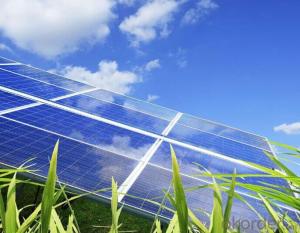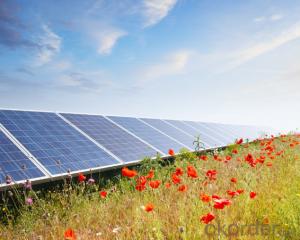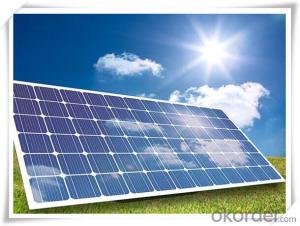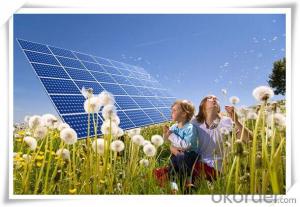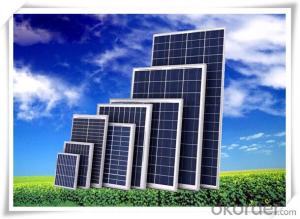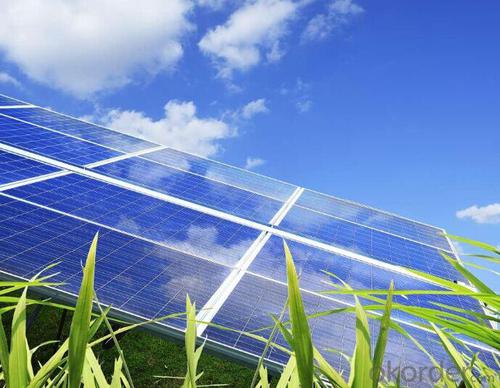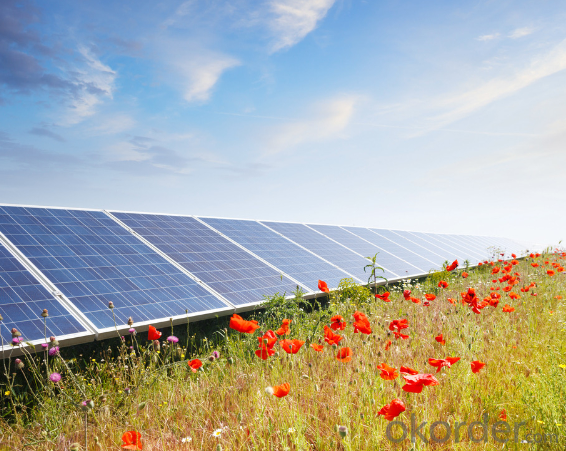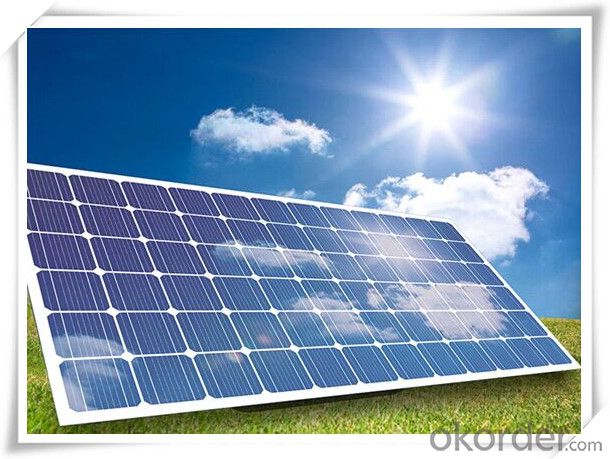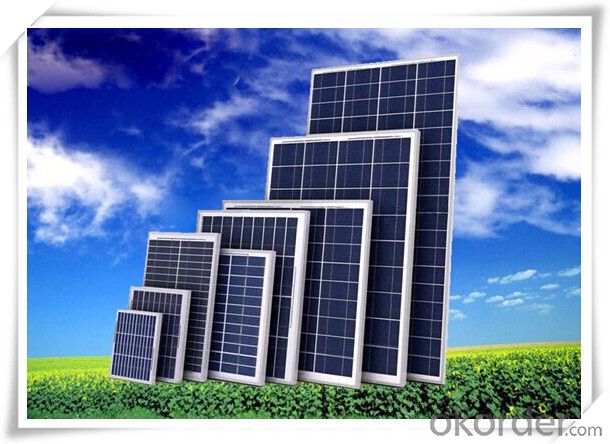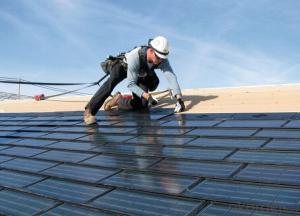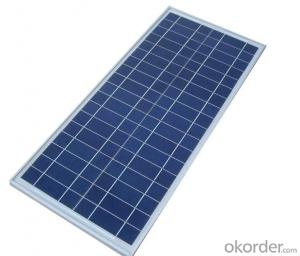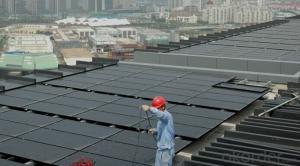Sunroom Solar Panels 320w Mono and Poly 260-320w Solar Panel CE/IEC/TUV/UL Certificate Non-Anti-Dumping Solar Cells
- Loading Port:
- China main port
- Payment Terms:
- TT OR LC
- Min Order Qty:
- 1000 watt
- Supply Capability:
- 100000 watt/month
OKorder Service Pledge
OKorder Financial Service
You Might Also Like
CE/IEC/TUV/UL Certificate Non-Anti-Dumping Mono and Poly 5W to 320W Solar Panel Solar Cells
Structure
Solar Module is the core part of solar PV power systems, also is the highest value part of it. The function of Solar Module is to convert the sun's radiation to electrical energy, or transfer it to battery and store in it, or to drive the load running.
Features
Our biggest manufacturer in china, they have stable prime quality, which ensure us to produce prime quality cells, each single cell is under inspection before packing;
Our solar panel production line is also full automated, we imported equipments from spain and japan;
We provide 15years warranty, and 25years working life;
We have full set quality certificates, product meets quality requirement of USA, Europe, Australia, UK etc ;
70% of our product exported to Europe, without quality claims up to now;
So we guarantee each piece of our panel has perfect appearance, positive power performance, and without quality hidden trouble.
The Product has been widely used in space and ground, it mainly used for power generation systems, charging systems, road lighting and traffic signs areas. It could offer a wide range of power and voltage, and with high conversion efficiency, and long service life.
1. 10 years limited product warranty
2. 15 years at 90% of the minimal rated power output
3. 25 years at 80% of the minimal rated power output
Images
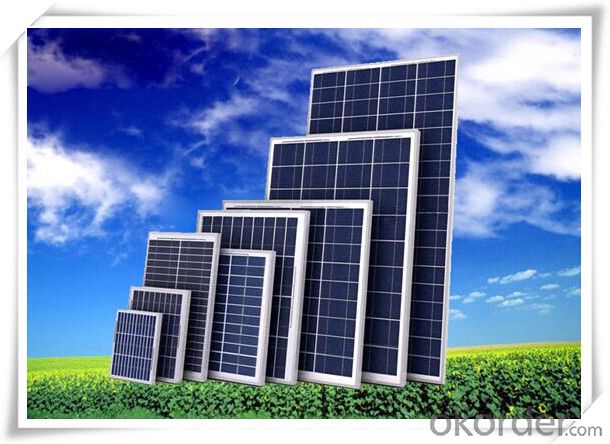
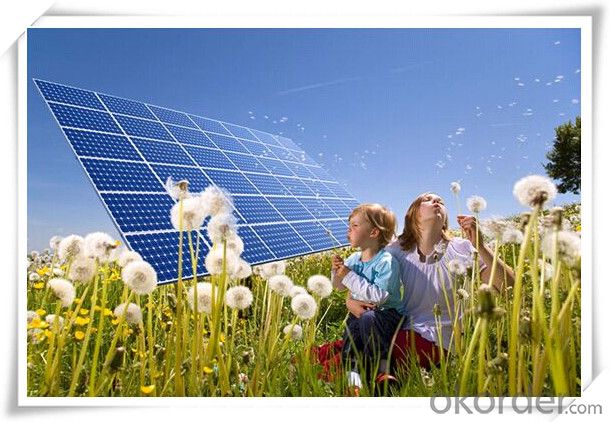
Specification
Pict
ITEM NO.: | Poly 156*156 cell ,60pcs . Power range from 230Wp-260Wp | ||||||
Maximum Power(W) | 230 | 235 | 240 | 245 | 250 | 255 | 260 |
Optimum Power Voltage(Vmp) | 29.4 | 29.5 | 29.7 | 30.1 | 30.3 | 30.5 | 30.7 |
Optimum Operatige Current(Imp) | 7.83 | 7.97 | 8.08 | 8.14 | 8.25 | 8.37 | 8.48 |
Open Circuit Voltage(Voc) | 36.7 | 36.8 | 36.9 | 37.1 | 37.3 | 37.5 | 37.7 |
Short Circuit Current(Isc) | 8.52 | 8.59 | 8.62 | 8.65 | 8.69 | 8.73 | 8.78 |
Solar Cell: | 156*156 Poly | ||||||
Number of Cell(pcs) | 6*10 | ||||||
Brand Name of Solar Cells | JA Cell, Bluesun Cell | ||||||
Size of Module(mm) | 1650*992*40/45/50 | ||||||
Cable & Connector Type | Pass the TUV Certificate | ||||||
Frame(Material Corners,etc.) | Aluminium-alloy | ||||||
Back sheet | TPT | ||||||
Weight Per Piece(KG) | 19.5KG | ||||||
FF (%) | 70-76% | ||||||
Junction Box Type | Pass the TUV Certificate | ||||||
Tolerance Wattage(e.g.+/-5%) | ±3%, or 0-3% | ||||||
Front Glass Thickness(mm) | 3.2 | ||||||
Temperature Coefficients of Isc(%) | +0.04 | ||||||
Temperature Coefficients of Voc(%) | -0.38 | ||||||
Temperature Coefficients of Pm(%) | -0.47 | ||||||
Temperature Coefficients of Im(%) | +0.04 | ||||||
Temperature Coefficients of Vm(%) | -0.38 | ||||||
Temperature Range | -40°C to +85°C | ||||||
Surface Maximum Load Capacity | 5400Pa | ||||||
Allowable Hail Load | 23m/s ,7.53g | ||||||
Bypass Diode Rating(A) | 12 | ||||||
Warranty | 90% of 10 years, 80% of 25 years. | ||||||
Standard Test Conditions | AM1.5 1000W/ 25 +/-2°C | ||||||
Packing | carton or pallet | ||||||
1*20' | 14 Pallets / 316pcs | ||||||
1*40'STD | 25 Pallets / 700pcs | ||||||
FAQ
Are you a trading company or manufacturer? | Manufacturer with factory |
What kinds of filter do you produce? | It covers for air filter,oil filter,fuel filter for car and truck |
Is Customized filter available? | Yes,please offer your required specifications and drawing |
Do you Accept OEM service? | YES! |
what’s your delivery terms? | FOB (2)CFR (3)CIF |
What's your Delivery Time? | 1)generally the samples will be sent immediately by the air express in 3-5 days if the goods are in stock |
2)Normally within 30 days,please confirm with us before order! | |
Trade and Market | Main Market Western European 20% |
- Q: How do solar panels affect home resale value?
- Solar panels can positively impact home resale value by providing potential buyers with energy savings and a reduced carbon footprint. Studies have shown that homes equipped with solar panels tend to sell at a higher price compared to similar homes without them. Additionally, solar panels often increase a home's appeal and marketability, making it more attractive to environmentally-conscious buyers.
- Q: So during the day, electricity is on, everything is on and working fine. But at night where there is no sunlight does all the electricity shut down for the night? So there is no light on for me during the night, or I can't watch tv at night? Is it also true that with solar panels, your bills are less expensive. Can someone please tell me these things
- Read this link.
- Q: The average solar panel produces 0% of the energy that is put into it. What is happening to the other 90%? Is it being reflected or is it being obsorbed by materials that are not a part of the solar cell? Is it possible to one day have near 00% efficient solar cell technology?
- Unlikely that we gan get to near 00% efficiency, although there is room for improvement. In the meantime, don't pooh-pooh 0% efficiency. That's about the rate of energy transfer up a food pyramid, perhaps a little less at the solar to plant level. As this manages to provide the basis for most of life on earth, it's nothing to sneeze at. As far as the other 90% goes, I would guess that much of it is reflected.
- Q: Can solar panels be installed in a remote location?
- Yes, solar panels can be installed in remote locations. In fact, remote areas with limited access to electricity grids can greatly benefit from solar panel installations. Solar panels are designed to operate independently and generate electricity from sunlight, making them an ideal solution for off-grid locations. They can be installed in remote areas such as deserts, mountains, or even on boats, providing a reliable and sustainable source of power.
- Q: How much energy can solar panels generate?
- The amount of energy solar panels can generate depends on various factors such as the size and efficiency of the panels, the location and orientation of the installation, and the amount of sunlight available. On average, a typical solar panel can generate about 250 to 400 watts per hour. However, larger solar installations or those with higher efficiency panels can generate several kilowatts or even megawatts of energy, which is enough to power homes, businesses, or even entire cities.
- Q: i was told that by making a solar panel they cause more pollution than they will end up getting rid of. Is that true?
- Long ago, say, in the 960's, it was true that solar cells did not return the energy of their manufacture. In those days, cells were 4% efficient, and made with more material and a less efficient process. Unfortunately, the myth persists that this is still the case today from unaccredited sources. Kudos to Michael for the nrel link. That study was actually done over 0 years ago, and since then, technology has advanced even further. Manufacturers have been able to reduce the thickness of cells in general in the last decade, to use less crystalline silicon. Also manufacturers such as Suntech with their pluto process are now able to use a lower grade of silicon, that takes less energy to refine. The result is that the energy payback time is even shorter today than estimated in the linked paper.
- Q: Can solar panels be used for powering a theme park or amusement park?
- Yes, solar panels can definitely be used for powering a theme park or amusement park. Solar energy is a clean and renewable source of power that can effectively generate electricity for various operations within a park, such as lighting, rides, and even water heating systems. By utilizing solar panels, theme parks can significantly reduce their reliance on traditional fossil fuels, lower their carbon footprint, and contribute to a more sustainable and environmentally friendly operation.
- Q: Can solar panels be installed on remote or off-grid locations?
- Yes, solar panels can be installed on remote or off-grid locations. In fact, off-grid installations are quite common for solar panels as they can provide a reliable and sustainable source of electricity without the need for a connection to the traditional power grid. The advancements in solar technology and the availability of battery storage systems have made it possible to generate and store electricity in remote areas, making solar panels an excellent choice for powering isolated locations.
- Q: Can solar panels be used in areas with limited space?
- Yes, solar panels can be used in areas with limited space. There are various options available, such as rooftop solar panels, solar canopies, or even solar panels integrated into building materials. These solutions are designed to maximize the utilization of limited space while still harnessing solar energy efficiently.
- Q: are there solar panel that work without the sun?
- No. Solar literally means Sun. But...scientists are working on a panel that can absorb energy after the sun has set. It may be years until we see any commercial success.
Send your message to us
Sunroom Solar Panels 320w Mono and Poly 260-320w Solar Panel CE/IEC/TUV/UL Certificate Non-Anti-Dumping Solar Cells
- Loading Port:
- China main port
- Payment Terms:
- TT OR LC
- Min Order Qty:
- 1000 watt
- Supply Capability:
- 100000 watt/month
OKorder Service Pledge
OKorder Financial Service
Similar products
Hot products
Hot Searches
Related keywords
